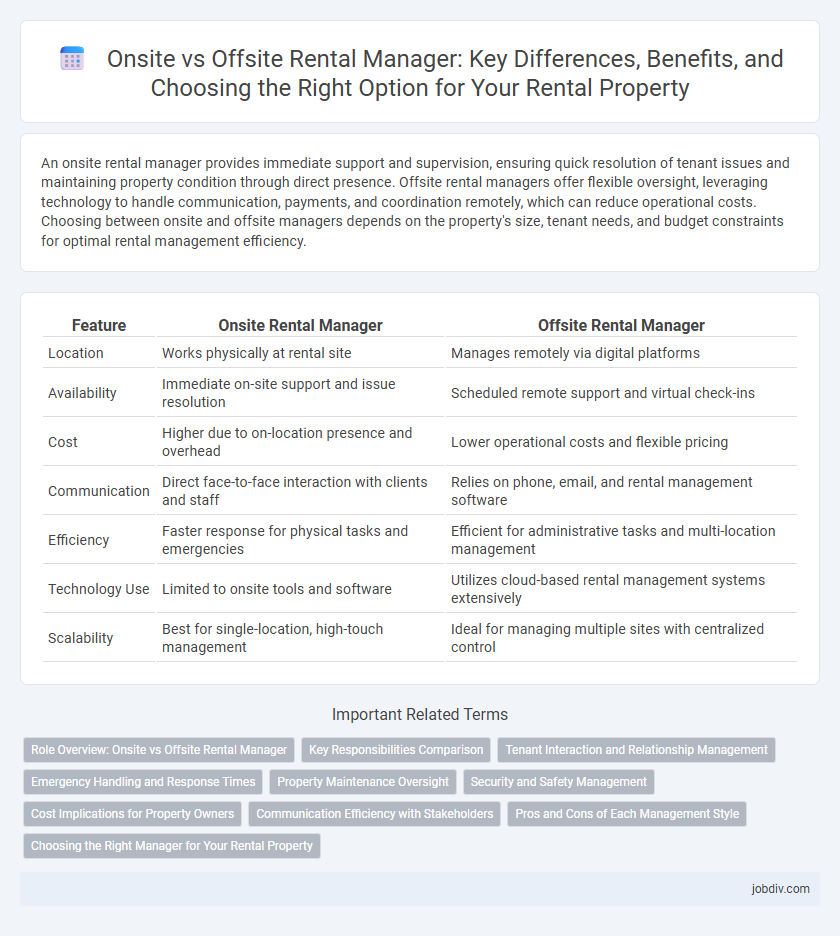An onsite rental manager provides immediate support and supervision, ensuring quick resolution of tenant issues and maintaining property condition through direct presence. Offsite rental managers offer flexible oversight, leveraging technology to handle communication, payments, and coordination remotely, which can reduce operational costs. Choosing between onsite and offsite managers depends on the property's size, tenant needs, and budget constraints for optimal rental management efficiency.
Table of Comparison
| Feature | Onsite Rental Manager | Offsite Rental Manager |
|---|---|---|
| Location | Works physically at rental site | Manages remotely via digital platforms |
| Availability | Immediate on-site support and issue resolution | Scheduled remote support and virtual check-ins |
| Cost | Higher due to on-location presence and overhead | Lower operational costs and flexible pricing |
| Communication | Direct face-to-face interaction with clients and staff | Relies on phone, email, and rental management software |
| Efficiency | Faster response for physical tasks and emergencies | Efficient for administrative tasks and multi-location management |
| Technology Use | Limited to onsite tools and software | Utilizes cloud-based rental management systems extensively |
| Scalability | Best for single-location, high-touch management | Ideal for managing multiple sites with centralized control |
Role Overview: Onsite vs Offsite Rental Manager
Onsite Rental Managers oversee daily operations directly at the rental location, ensuring immediate customer service, equipment maintenance, and inventory management. Offsite Rental Managers coordinate rental activities remotely, focusing on strategic planning, vendor relations, and overall logistics without physical presence at the site. The onsite role demands hands-on management and quick problem-solving, while the offsite role emphasizes administrative oversight and long-term rental portfolio optimization.
Key Responsibilities Comparison
Onsite Rental Managers handle daily property operations, tenant relations, maintenance coordination, and immediate issue resolution, ensuring smooth facility management. Offsite Rental Managers focus on lease agreements, rent collection, financial reporting, and long-term strategic planning, often managing multiple properties remotely. The key difference lies in onsite managers' direct interaction with tenants and property upkeep versus offsite managers' emphasis on administrative tasks and portfolio oversight.
Tenant Interaction and Relationship Management
Onsite Rental Managers provide direct, face-to-face tenant interaction, fostering stronger personal relationships and promptly addressing tenant concerns. Offsite Rental Managers rely on digital communication and scheduled visits, which may limit immediate responsiveness but offer efficient multitasking across multiple properties. Effective tenant relationship management often depends on the balance between accessibility and operational scope in either role.
Emergency Handling and Response Times
Onsite Rental Managers provide immediate emergency handling with rapid response times due to their physical presence at the property, ensuring quick resolution of urgent issues. Offsite Rental Managers rely on remote communication, which can lead to delayed responses and potential complications in emergencies. Choosing onsite management enhances tenant safety and minimizes property damage through faster on-the-spot interventions.
Property Maintenance Oversight
Onsite rental managers provide immediate property maintenance oversight, ensuring rapid response to tenant repair requests and routine inspections that prevent long-term damage. Offsite rental managers coordinate maintenance services remotely, often relying on third-party contractors, which can result in slower response times but may reduce operational costs. Effective property maintenance oversight directly influences tenant satisfaction and property value preservation in both management models.
Security and Safety Management
Onsite rental managers provide immediate security responses and hands-on safety monitoring, ensuring quick resolution of emergencies and compliance with health regulations. Offsite rental managers rely on remote surveillance technology and coordinated communication with local security personnel, which may delay reaction times during critical incidents. Effective security and safety management in rentals demands a balance of onsite presence for rapid intervention and offsite resources for comprehensive monitoring.
Cost Implications for Property Owners
Onsite rental managers typically incur higher costs for property owners due to salaries, benefits, and onsite living expenses, which can increase overall operating expenses. Offsite rental managers offer a cost-effective alternative by managing multiple properties remotely, reducing overhead and allowing for scalable service fees tailored to owner budgets. The choice between onsite and offsite management significantly impacts net rental income and budget allocation for property maintenance and tenant support.
Communication Efficiency with Stakeholders
Onsite Rental Managers enhance communication efficiency by providing immediate, face-to-face interactions with tenants, vendors, and maintenance teams, resulting in swift issue resolution and real-time updates. Offsite Rental Managers rely heavily on digital tools such as emails, phone calls, and project management software, which can introduce delays and reduce the nuance of communication. Effective stakeholder communication is crucial in both models, but onsite presence significantly improves responsiveness and clarity in managing rental operations.
Pros and Cons of Each Management Style
Onsite rental managers provide immediate tenant support, faster issue resolution, and daily property oversight, enhancing tenant satisfaction and property upkeep; however, their costs are typically higher due to salaries and benefits. Offsite rental managers offer cost-effective solutions, often managing multiple properties remotely via digital platforms, yet they may face delays in addressing maintenance issues and less direct tenant interaction. Choosing between onsite and offsite management depends on property size, budget, and desired tenant engagement levels.
Choosing the Right Manager for Your Rental Property
Choosing the right manager for your rental property involves evaluating the benefits of an onsite rental manager who provides immediate oversight and direct tenant interaction versus an offsite rental manager who offers broader market knowledge and cost efficiency. Onsite managers excel in handling daily maintenance, tenant requests, and fostering community relations, while offsite managers leverage technology for streamlined rent collection and vacancy management. Property owners must prioritize factors such as property size, location, tenant needs, and budget to determine the optimal management solution that maximizes rental income and tenant satisfaction.
Onsite Rental Manager vs Offsite Rental Manager Infographic

 jobdiv.com
jobdiv.com